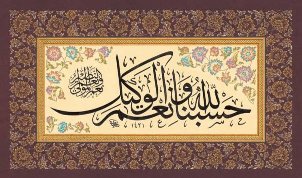
 |
|
Customs and Traditions |
||
|
||
Hasbonallaaho wa Ne'mal Wakeel: Allaah is sufficient for us, He is an Excellent Trustee |
||
|
||
Every New Year, the first ten days (asharah mubaarakah) of Muharram is marked by the historic event of the martyrdom of Imaam Husain (as), the son of Ali ul-Murtazaa (as) and the grandson of Prophet Mohammad ul-Mustafaa (saws), which is commemorated by setting up water stalls (sabeel)and doing mourning assemblies (majaalis-e-'azadari). In these ten days special morning discourses are held in the Main Mosque in the presence of Da’i-e-Mutlaq where Isma’ili-Taiyebi ideology and ethos is taught and a message of sacrifice and safeguarding ones belief is given taking into account the martyrdom of the people of Karbalaa. In honour of the truth on which the whole event of Karbalaa stood and remembering the hardships, thirst and hunger of the martyrs of Karbalaa, the tradition of setting up of the water outlet (sabeel) made of pure Silver is still alive in the community. The huge silver sabeel is built every year in Badri Mohalla, Vadodara, in a space between the Main Mosque and the residence of the Da’i. It was first built in Mumbai on Mohammadali Road sixty years ago, during the time of 42nd Da'i, Saiyedna Fidaali Badruddin (d. 1377 AH/1958 AD. Every year, while going into the mosque, Da’i sits near this sabeel and drinks a sip of water offered by the care-taker and then proceeds for the discourse. Congregational prayers and assemblies are held chiefly on every Friday, first night of every Hijri month, first ten days of Moharram – commemoration of the martyrdom of Imaam Husain in Karbalaa, 20th Safar – Chehlum (40th day after the martyrdom of Imaam Husain), 2nd Rabi’ ul-Awwal – Birthday and demise of the Prophet Mohammad ul-Mustafaa (saws), 4th Rabi’ ul-Aakhar – Birthday of Imaam uz-Zamaan and Da’i uz-Zamaan, 15th Rajab – Birth of Ali ul-Murtazaa (as) in Ka’bah, night of 27th Rajab – Ascension to Heavens of theProphet Mohammad ul-Mustafaa (saws) i.e. Me’raaj, night of 15th Sha’baan – Change of Qiblah and the night of forgiveness, 30 nights of Ramazaan – Midnight (nisf ul-layl) prayer recited with rhythmic verses (munaajaat), night of 17th Ramazaan – Remembrance of the Merits of Ali ul-Murtazaa (as), night of 19th Ramazaan – night of affliction (zarbat) on Ali ul-Murtazaa (as),night of 21st Ramazaan - Martyrdom of Ali ul-Murtazaa (as), night of 23rd Ramazaan – the celebrated night of salvation, night of 30th Ramazaan – night of Eid ul-Fitr, 9th Zul Hijjah – day of Hajj Pilgrimage i.e. arafah, night of 10th Zulhijjah – night of Eid ul-Azhaa (ritual sacrifice – zabeehat), 18th Zul Hijjah – day of ascension of Ali ul-Murtazaa (as) at the status of wasi i.e. became vicegerent of Mohammad ul-Mustafaa (saws) at Ghadeer-e-khumm. Social gatherings take place mainly on the occasions of naming of the new born child and circumcision (aqeeqah and khatnah), birthdays (milaad), religious oath (mithaaq), marriage (waleemah), inauguration or opening ceremony of a new house or business (iftitaah), commemoration of the late Da'i (urs), ritual food for a deceased person after 3 days, 40 days, 4 month 10 days and after a year (ziyaarat, chaalismu, cha-maasi, warsi), ritual food after the pilgrimage (wakeerah), engagement ceremony, joint ritual food in the month of Moharram and Ramazaan (niyaaz and iftaari). A ceremony of fixing the date for marriage is a special occasion for both the bride and bridegroom. Saiyedna call them along with their respective parents to perform this ceremony in which guidance is given to them to respect the needs of each other and share the responsibilities to form a peaceful home by acting as a sincere and loyal Alavi Bohra. A wedding card is first offered to Saiyedna and then only it is distributed among relatives and friends. There are 12 most prime Prophetic Traditions (sunnat) which every Alavi Bohra has to follow and conform to them in his life. In it there are 6 types of relations with whom he has to build close, warm and amiable relationship. They are 1) Parents, 2) Wife and Children, 3) Neighbor, 4) Close relatives, 5) Servants and 6) Community members. Other 6 are based on social harmony and good character, they are 1)Always do good deeds, 2) Shun bad things, 3) Salute (say salaam)and be friendly to others, 4) Invite people and prepare food for them, 5) Visit a sick person and 6) Always speak truth and be honest. Discipline is supreme in every walk of a believer’s life. Etiquettes and well-defined rules (aadaab) govern in meeting Saiyedna, visiting graves, taking meals, sitting in an assembly (majlis), sleeping, travelling, maintaining sexual relationship, acquiring lawful knowledge, answering nature’s call (bayt ul-khalaa, toilet), mosque, walking with parents, visiting a sick person, preparation of Friday prayers, observing fast, reciting Qur’an, talking with elders, constructing a house, behaving with a guest etc. Offering pilgrimages to the holy shrines of the Prophets, Faatemi Imaam (A’immat-e-Faatimiyeen),celebrated missionaries (du’aat-e-amjadeen) and devout saints (Mawaali-e-Tahereen) who acted and proved to be a role model by sacrificing their life and wealth in guarding the Da’wat and Isma’ili Taiyebi faith, plays an important role in the devotional life of Alavi Bohras. The places of pilgrimage abroad include Syria, Jordan, Karbalaa, Najaf, Bayt ul-Muqaddas, Misr and Yaman; while in India it includes Ahmedabad, Khambhat, Patan, Denmaal, Dongaam, Galiyakot, Kapadwanj, Umreth, Mai saheb etc. There are rest houses or sanatoria (musaafir-khaanas) for the Zaa’ereen (visitors who come to the holy tomb for blessings-barakaat and supplications-du’a) providing them with lodging and boarding facilities in several cities run by charitable organizations. |
||
Copyright
© 2016 Alavibohra.org All rights reserved. |
||
